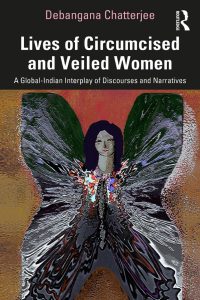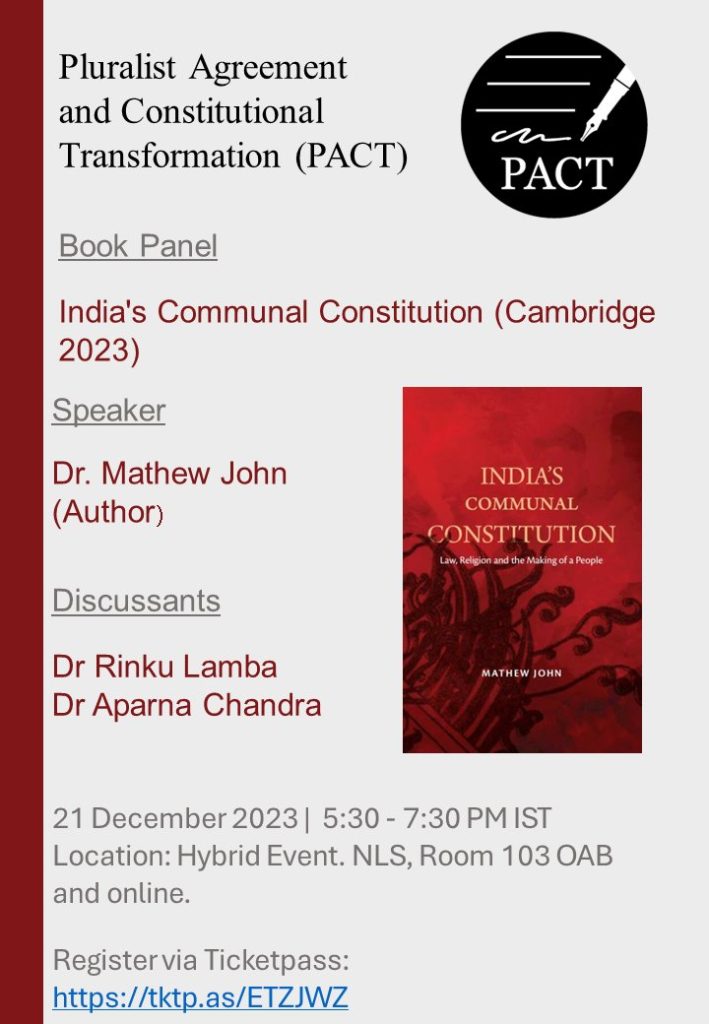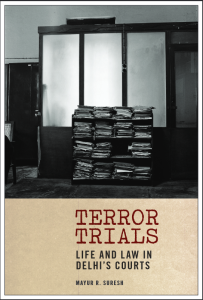The National Law School Of India University (NLSIU) invites you to a special lecture on “Moral Vaccination: Ideas and Institutions in the Control of Contagion in India and China in the 19th and 20th centuries”, to be delivered by Dr. Prerna Singh, on Thursday, 4th January 2024.
About the speaker
Prerna Singh is Mahatma Gandhi Associate Professor of Political Science and International Studies at Brown University. She holds appointments across Political Science and the Watson Institute for International and Public Affairs, and is also affiliated with the Departments of Sociology and the Center for Contemporary South Asia. Singh is a fellow of the Canadian Institute of Advanced Research (CIFAR) and co-convenor of the Brown-Harvard-MIT Joint Seminar in South Asian Politics.
Prerna Singh’s research focuses on the improvement of human well-being, particularly as it relates to the promotion of social welfare on the one hand, and to the mitigation of ethnic conflict and competition, on the other. Her work combines multiple methods including comparative historical, ethnographic, statistical, survey and experimental analyses.
Abstract
Prerna will present on her new book project in which she develops a moral theory of popular compliance with public health interventions, such as vaccination, through a comparison of China and India from the turn of the nineteenth into the twentieth century.
Selected Excerpts from the Lecture
“Most of my work so far has really been committed to this idea of trying to understand what are the conditions under which we promote human flourishing. The way that I have thought about human flourishing or well-being is through two broad trajectories, one is questions of social development, social welfare and the other is the question, which we might broadly define as us-them relations.”
“Withing the second trajectory, which is what I will be focusing on today, is trying to come up with this idea of a moral theory or the moral foundations of development. If we think about most of the ways in which we understand the drivers of human development, I argue that they can be reduced to a pretty ‘homo-economicus-rational actor model’ of trying to understand how development happens and the ways in which primarily state but other agents incentivize and prioritize social development.”
“In comparative politics, the main idea/arguments of why is it that the state is more likely to prioritize social development are that is a state is wealthier therefore it can afford to, or whether it is democratic the mechanism there is often that you are accountable to a ballot box, or political competition and being held accountable to a certain constituency.”
“So what I am trying to do is to shift towards an idea which is called ‘homo-morales’. Anne Marie Slaughter and Hillary Cottam call this ‘Sapiens Integra’, so not ‘homo-economicus’ but a much more wider Weberian conceptualization of rationality, in which we can think of things like norms, values, beliefs, world-views, trust, legitimacy and authority, as well as shared solidarities as being the drivers of development.”
“COVID has been this grim reminder of the specter of infectious diseases, and historically infectious disease remain the single largest cause of human mortality, killing more people than all wars, all natural disasters, and all non-infectious diseases combined. They have been the silent but decisive sub-text for political history, changed the course of wars (think of Napolean’s expedition in Russia, the decline of empires – the Holy Roman, the Ching, and the successive revolutions.”
“One of the most cited pieces in social sciences, an article by Daron Acemoglu and James A. Robinson, about how colonial institutions affect political and economic outcomes today, but again they argue that what determines the nature of colonial institutions particularly settler mortality or non-settler mortality or non-settler colonialism is actually settler mortality, which is influenced by infectious diseases.”
“The 20th century see this whole bacteriological revolution and epidemiological transition, decline in infant mortality, huge spike in life expectancy, but event today we continue to see this threat of vector borne diseases, and climate change is only going to make that much worse. Climate change is exacerbating the threat we face from new as well as existing pathogens.”
“Infectious diseases are so terrifying because of these consequences that I have laid out (in the lecture), but really critically because of this very chilling, stealthy mode of transmission, the fact that they kind of seamlessly pass through ever more tightly policed borders. Zica and Ebola, are a cause of major political concern in North America, in the way that poverty in the same countries in Africa and Latin America is not, as poverty is not contagious.”
“The overarching question of the project is really this – what explains the variations in the control of contagion historically, across political borders, despite shared epidemiological histories, and demographic and socio-economic conditions? So, that is the sort of broad comparative question, that drives the book.”

 Circumcised and Veiled Women: A Global-Indian Interplay of Discourses and Narratives” on Wednesday, 27th December, 2023. Prof. Dhivya Janarthanan will be the discussant.
Circumcised and Veiled Women: A Global-Indian Interplay of Discourses and Narratives” on Wednesday, 27th December, 2023. Prof. Dhivya Janarthanan will be the discussant.
 In this week’s faculty seminar, Dr. Mayur Suresh, Senior Lecturer in Law, SOAS, will be presenting on his book titled “Terror Trials: Life and Law in Delhi’s Courts” on Wednesday, 20th December, 2023. Dr. Manpreet Dhillon, Academic Fellow will be the discussant.
In this week’s faculty seminar, Dr. Mayur Suresh, Senior Lecturer in Law, SOAS, will be presenting on his book titled “Terror Trials: Life and Law in Delhi’s Courts” on Wednesday, 20th December, 2023. Dr. Manpreet Dhillon, Academic Fellow will be the discussant.